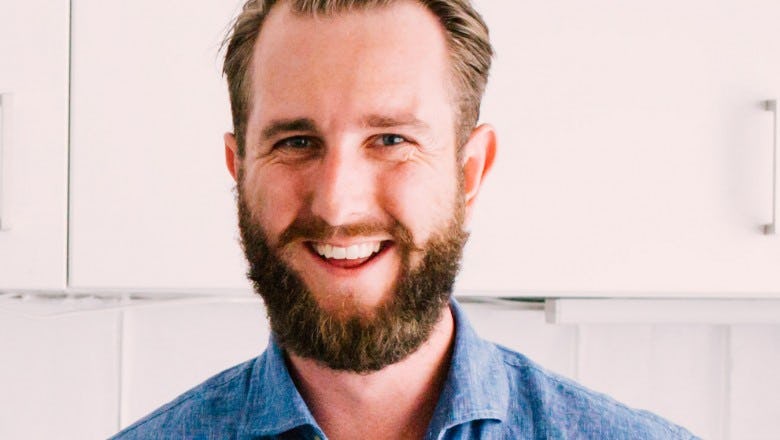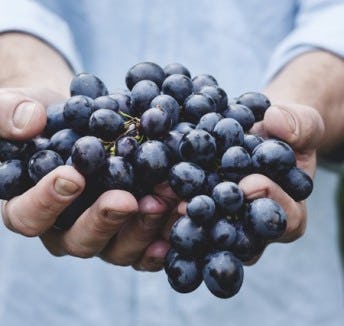
Meet Jordy van Meer, Co-founder of Scrambled, a food and tech startup that publish daily recipes based on Supermarket deals. Guest speaking at our next edition of Amsterdam Talks tech, Jordy shares his thoughts on empowering the engaged consumer through mobile technology.
Spaces: Hi Jordy, Can you tell us about what you do?
Jordy van Meer: I’m one of the founders of Scrambled, a company that does shopping list marketing and technology. Within Scrambled we’ve created three products, of which Koken met Aanbiedingen (a free app for iOS and Android) is one. I’m responsible for all the creative work, quality assurance of video production and photography, concept, strategy, operations and partially for sales. It might seems like a lot, and it is, but in a fast growing startup you have to wear multiple hats constantly. Every day is different, probably chaotic, most definitely a challenge, but always good fun.
Can you tell us about your background and how it lead you to where you are?
I’ve been trained at the Willem de Kooning Academy in Rotterdam where I specialised in Visual Interface and Interaction Design and the Maryland Institute College of Art in Baltimore, Maryland, where I specialised in Interactive Media. This lead me to a career as a Designer and Art Director with a passion for photography working at various advertising agencies like Nomads, StrawberryFrog, MUSE and IceMobile where I worked for a variety of brands like Canon, Audi, Procter & Gamble, ABN Amro, Albert Heijn and Samsung. At Icemobile the focus was on food retail, which is how I became entangled in the food & tech business. The day I left Icemobile is when we started Scrambled where food & tech are the integral parts of our company. We literally work in a kitchen, which can sometimes be hectic. The advantage is that there’s never a shortage of good freshly cooked food!
What are some of the industry related apps and websites that impress you the most?
First of all I wish we had something like Instacart in Amsterdam. The society we live in is becoming more and more aimed towards convenience so we can spend the time we save doing the things we love and not the chores we dislike. Instacart does the grocery shopping for you and delivers your groceries within the hour to your door. This is a service I’d gladly pay for. The way they do this is kind of a secret, but I do know they hired some of the smartest supply chain geniuses from Amazon when Instacart started. It might seem easy to do, but logistically it’s really well done.
An app I use very regularly myself is Vivino. It’s an app that helps you find great wines. Vivino made me grow from a wine newbie to actually knowing what I want and like in a wine and be able to shop for it in the store or make an educated choice from a wine list in a restaurant. It scans both wine menu’s and bottle labels for you with ratings, reviews and average price as a result. There’s a great personal touch to it and technology wise they do a great job with their image recognition and matching algorithms.
How do you harness tech? What role do you see tech playing in your business?
The majority of the work we do is recipe creation coupled with supermarket offers from that week. Therefore our lead-time has to be very short and we need to work in very efficient and smart ways to make sure all 60 recipes we publish in a week are correct in terms of ingredients, amounts, description, and of course, pricing. To do all this we’ve developed extremely smart software and well organised databases that save us heaps of time every day.
We’re constantly inventing ways to automate parts of the process or make improvements to save time or be less prone to errors. Next to that we’re always improving our Android and iOS apps to make sure the people who use it can benefit from it in every way possible. In short, food & tech are completely intertwined in our company.
What are your thoughts on the future of tech and food? Which direction do you see it heading in?
We’re only at the start of what we can begin to imagine what’s possible with food and technology. I think it’s very hard to say which direction we’re heading in, because at this moment in time we’re exploring at lot of different directions or different facets of the industry on both ends of the spectrum. There are two things that fascinate me at the moment. One is how we’re becoming more critical of what we are eating and where it comes from or how it was treated.
Right now it’s a small group with a loud voice, but I’m convinced this will spread and become mainstream. This will have great impact not only on the big supermarket chains, but will also empower local businesses. That’s also the hook to the second thing I’ve recently been captivated by. It’s a thing called AgroTech. It looks for innovative, sustainable technology of the production of food. There’s a startup called ZipFarm, who create a product that let’s you do your own indoor farming on any scale with a vertical system that is highly scalable. I think it’s incredibly cool and really empowers local aspirational farmers to grow good produce and serve a market. It’s definitely worth checking out.
What companies do you look to for inspiration?
It might be a bit of a cliché, but inspiration for me doesn’t come from one place. It comes from all over the place, all the time. This ranges from my wife to other startups, to a person like Elon Musk to an art piece I find in a museum or gallery. Next to that I also draw a lot of inspiration from the people I work with and surround myself with in a non-working environment.
What are your thoughts on the tech startup scene in Amsterdam?
The tech startup scene is definitely growing in Amsterdam and becoming more and more visible, but it’s still baby steps and quite an in-crowd sometimes. Right now it’s very visible to the people who work in the scene but less visible to the people outside of it. There are some great companies doing really nice stuff and they should be given more of podium to demo what they’re trying to accomplish to the outside world. This is why events like Amsterdam Talks Tech are great.
What advice would you give to people aiming to integrate tech as a central component in their business?
I’m trying to think of companies who don’t greatly benefit from using technology, but it’s hard to think of any. Let’s say you’re a company who’s looking at integrating more tech in their company or give it a more central stance. I think it’s a matter of starting small and lean, and look at what you actually use and what makes your job or company work in a more efficient way. Technology shouldn’t get in the way of things, it should be ubiquitous. We’ve experimented with multiple statistics and analytics packages but we’ve experienced a lot of packages are bloated with things you don’t use or need and we mostly end up going for the lean versions.
How did you startup in the food & tech industry?
Long story short, we started our company with ex-employees of Icemobile. After a failed recipe platform, we pivoted, as they say in startup terms, and the result of that was Koken met Aanbiedingen, which sparked two more products that are now all under the umbrella name ‘Scrambled’, which ironically was the name of the failed recipe platform!
Great, thanks Jordy.
You can listen to Jordy speak about starting up and integrating food and tech in our Amsterdam Talks Tech VI: The Food Edition.
For a more detailed programme of the evening and to get your tickets, visit our events page here.
Share this article
 Read now What is the Internet of Food?
Read now What is the Internet of Food?
 Read now The Google Food Program
Read now The Google Food Program